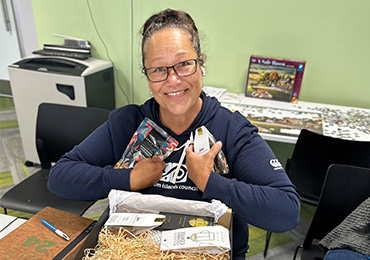Rana Solomon - celebrating 20 years
Rana Solomon, Emergency Manager, has been serving the Chatham Islands Council for a very impressive 20 years!
We asked her a few questions in honour of this momentous achievement...
Can you tell us more about your role and background?
Emergency Group Managers are responsible for leading and coordinating all aspects of emergency planning, before during and after emergency events for the safety and well-being of individuals and the community.
What do you like the most about working in Emergency Management?
There are always challenges and it's an area that is constantly changing.
What do you see as the biggest accomplishments since your start in 2004?
Given the restraints with resources successfully coordinating and leading response efforts during disaster events with minimal, property damage and no loss of life.
What has been your biggest “lesson learned“ in these 20 years?
There is no such thing as NO, it just means we have to find another way. Just being seen to be doing is not enough. That is the importance of resilience, adaptability and persistence in finding solutions, even when faced with obstacles or initial setbacks. 
If there's one thing you could improve, what would it be?
Enhancing community engagement and participation in emergency preparedness and response efforts. By fostering stronger relationships with residents, empowering them with knowledge and resources, and involving them in decision-making processes to better equip the community to handle disasters.
What is your biggest hope for the next decade in Emergency management?
One of the biggest hopes for the next decade in emergency management is the widespread adoption and integration of advanced technology and data analytics. This includes the use of artificial intelligence, predictive modelling, and real-time monitoring systems to enhance early warning capabilities, improve response times, and mitigate the impact of disasters on communities worldwide.
Additionally, increased collaboration between public and private sectors, along with greater emphasis on community resilience and preparedness, offering promising opportunities for more effective disaster management and response efforts in the years to come.
Why does this work matter?
This work matters because it directly contributes to saving lives and livelihoods. Effective emergency management ensures that communities are prepared to respond to disasters, minimising the loss of life and property damage. By safeguarding individuals, families, and businesses during times of crisis, emergency management efforts support the stability and resilience of communities.
